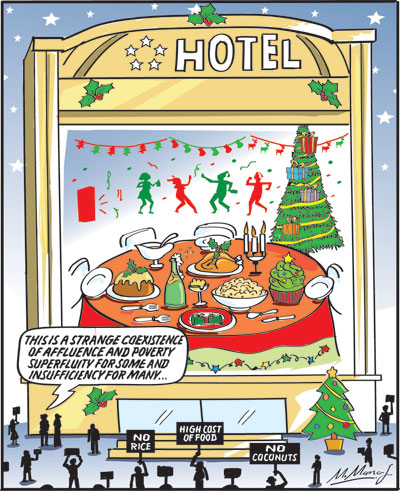Columns
Christmas festivities amidst poverty and deprivation
View(s):This Christmas, like the last Christmas and those before, brings out the disparity of livelihoods in the country. While the affluent are feasting, a third or more of the population are in poverty. Hungry and malnourished, they are struggling to cope with the high prices of essentials with their inadequate incomes.
Paradox
This disparity is witnessed in many sectors. The vehicles on Colombo roads give the impression of a city in a developed country. Restaurants are filled on weekends and even on weekdays, even though they are expensive.
Roads
When one travels from Colombo on the roads to Kandy, Galle, Negombo, or any outstation city, the continuous stretch of buildings makes one wonder whether Sri Lanka is a developed country. They are not the infrastructure of a less developed country. How have people found the resources to build these impressive buildings? What are their sources of income? How is it that poor households have television sets, rice cookers, and electrical appliances?
Phones
The poor who struggle to feed themselves have as many smartphones as those in a rich household. Recognising this reality, the Ceylon Electricity Board (CEB) only issues electricity bills online. Similarly, many poor homes have electrical appliances that only affluent or upper-middle-income households could afford several decades ago.
Are we poor people in a rich country or rich people in a poor country?
Christmas
Christmas is the religious festival of only about 8 percent of the population in the country. Yet, Christmas is so widely celebrated that the government has allowed the import of chicken and eggs for the people to enjoy. It is a national celebration, as in most countries, sans its religious significance.
Colombo
Last Christmas many of those who descended from Britain, the US, Canada, and Down Under ex-claimed, “Colombo is like a city in a developed country!”
In contrast, those who stayed in some suburbs were appalled by the living conditions of the poor. So I continue to be baffled by this poverty amidst affluence and have no answers to offer. I sweep this paradox under the carpet as one of the mysteries of the economy. Is it mass-scale drug trafficking, remittances that are not accounted for in the official statistics, or some other reasons? We do not know.
Global
Many countries have reduced poverty significantly. Our large neighbours—China and India—are lead-ing examples. They have reduced poverty significantly, while income disparities abound. They are both caught up in what Nobel Prize laureate Amartya Sen called “growth madness.”
The poor will be with us always unless there is a drastic change in policies that ensure “sufficiency for all before superfluity for some.”
Developed countries
Many developed countries too have unacceptable levels of poverty despite their high per capita incomes. The diversion of a fraction of their expenditure on armaments could eliminate poverty and improve the living conditions of their poor.
Balanced view
Sri Lanka’s economic and social development since 1931 and after independence is one of improve-ments in social indicators. There have been impressive achievements in literacy, education, and health. However, income inequality has remained around the same. Has poverty, however, decreased?
Christmas wish
This year’s Christmas wish must surely be to transform the political culture, social values, work ethic, and morality to achieve a rich and prosperous society for all.
Difficult task
This cannot be achieved in a year or even five, but the foundations can be laid. However, already some faltering steps have weakened the government’s capacity to make that uphill task a reality. Corrective steps must be taken, and a redoubling of the efforts is needed to transform the economy, polity, and society.
Implementation
The road to building an economy that ensures prosperity for all cannot be achieved by good intentions alone; it has to be achieved by a multiplicity of strategies effectively implemented.
The poor cannot be made rich by making the rich poorer. Yet the rich must surely give unto Caesar that which is needed by him for development.
Pragmatic economic policies that ensure fiscal consolidation and economic stability are vital. The containment of corruption is another economic imperative. Increasing production for exports is critically important. All these cannot be achieved in a day, a month, or a year, but the firm foundations must be laid now to achieve a rich and prosperous society for all. It must ensure sufficiency for all rather than superfluity for some.
Conclusion
It is important that the government is not distracted by trivialities, such as the controversy over the academic qualifications of MPs, as has happened in recent weeks.
The government’s focus must be on the eradication of corruption, forging national unity, and the transformation of the political culture, social values, and work ethic.
The government’s resolve to eradicate corruption, achieve a united nation, and transform the country’s political culture and social values are formidable challenges. They should not be distracted by trivialities nor misguided by extreme ideologies.
Buying or selling electronics has never been easier with the help of Hitad.lk! We, at Hitad.lk, hear your needs and endeavour to provide you with the perfect listings of electronics; because we have listings for nearly anything! Search for your favourite electronic items for sale on Hitad.lk today!


Leave a Reply
Post Comment